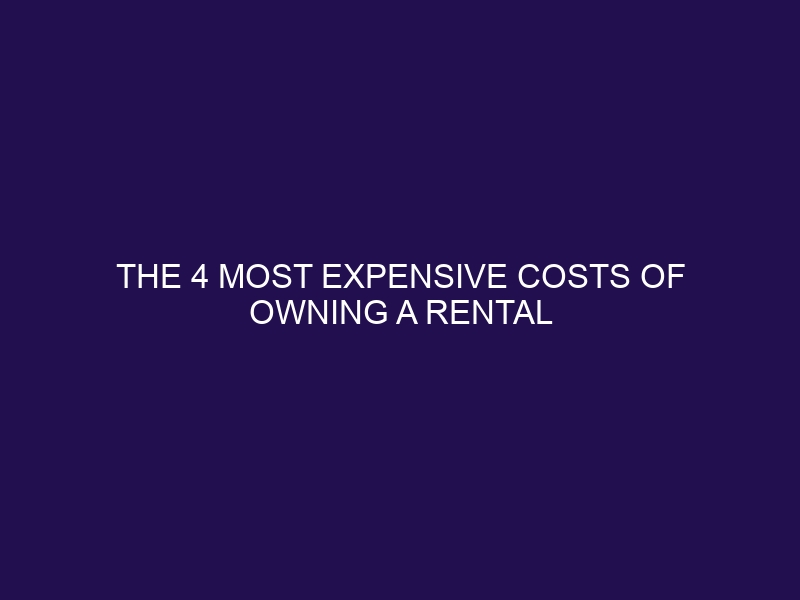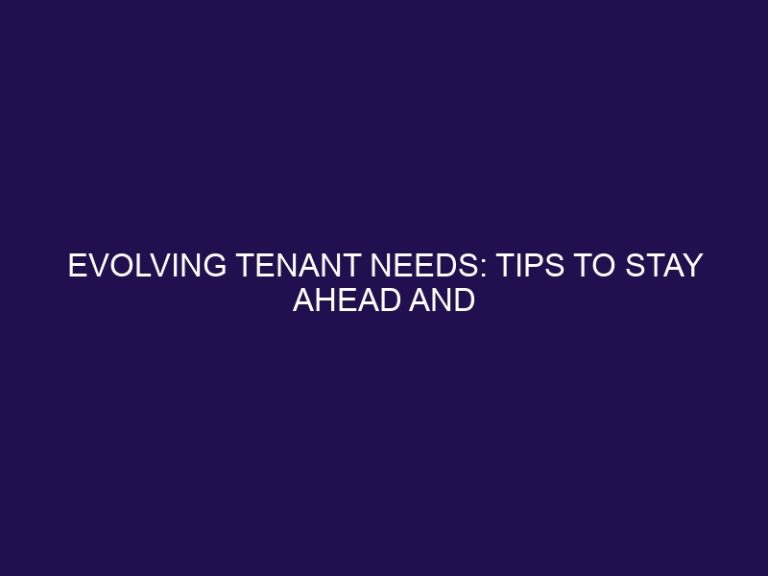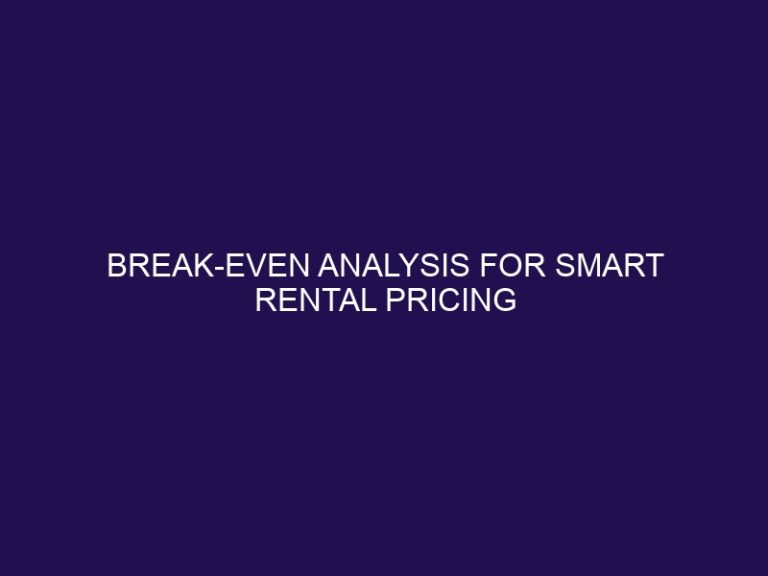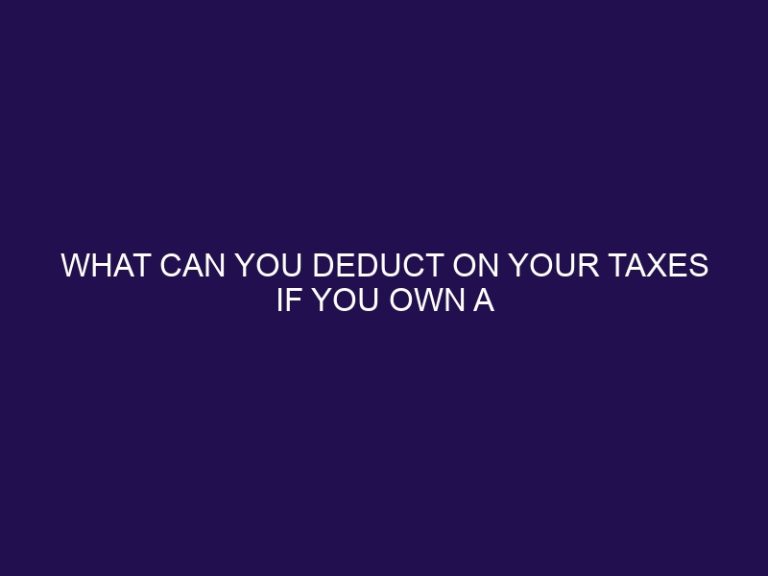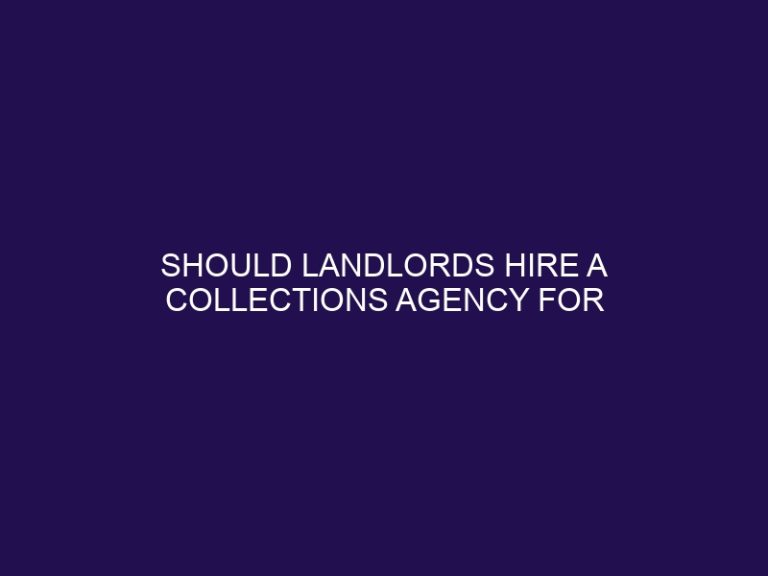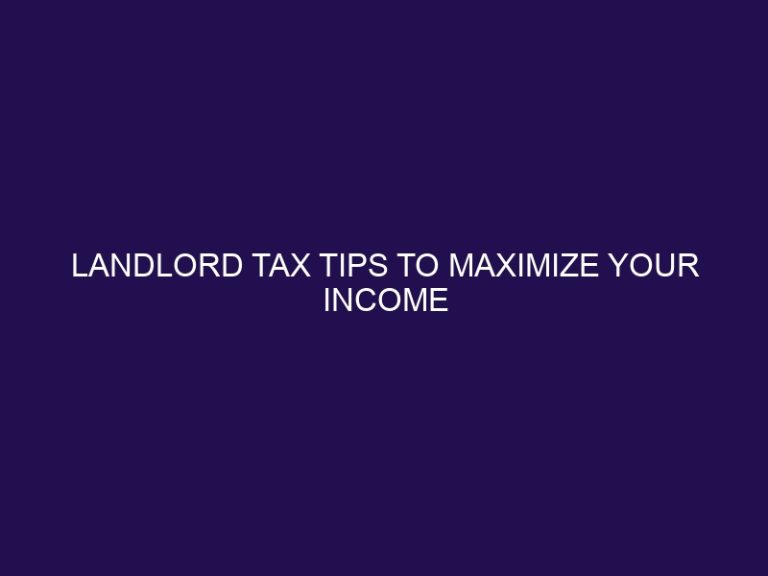The 4 Most Expensive Costs of Owning a Rental Property
Introduction to Owning a Rental Property
Owning a rental property can be a lucrative investment, providing a steady stream of income and potential for long-term financial stability. However, it is important to consider all the costs associated with owning a rental property before making the decision to invest. In this article, we will discuss the four most expensive costs of owning a rental property and how they can impact your overall return on investment.
The Cost of Purchasing a Rental Property
The initial cost of purchasing a rental property can be a significant investment. Some of the major costs to consider include:
- Down Payment
Like any other real estate investment, purchasing a rental property requires a substantial down payment. This can range from 20% to 30% of the property’s purchase price, depending on the lender and your creditworthiness. - Closing Costs
In addition to the down payment, there are also closing costs associated with purchasing a rental property. These can include appraisal fees, title insurance, and attorney fees, among others. - Renovations and Repairs
If the rental property requires any renovations or repairs before it can be rented out, these costs can add up quickly. It is important to budget for these expenses and factor them into the overall cost of purchasing the property.
The Cost of Maintaining a Rental Property
Once you have purchased a rental property, there are ongoing maintenance costs to consider. These can include:
- Property Taxes
Property taxes can vary greatly depending on the location of your rental property. It is important to research the property tax rates in the area where you are considering investing. - Insurance
As a landlord, you will need to have insurance coverage for your rental property. This can include property insurance as well as liability insurance to protect you in case of any legal issues with tenants. - Utilities
In most cases, landlords are responsible for covering the cost of utilities for their rental property. This can include electricity, water, and gas, among others. - Property Management Fees
If you choose to hire a property management company to handle the day-to-day operations of your rental property, this will come at a cost. Property management fees typically range from 8% to 12% of the monthly rental income.
The Cost of Dealing with Problem Tenants
Unfortunately, dealing with problem tenants can also be a costly expense for rental property owners. Some of the potential costs to consider include:
- Legal Fees
If you need to take legal action against a problem tenant, this can result in significant legal fees. - Eviction Costs
In the worst-case scenario, you may need to evict a tenant from your rental property. This can involve hiring an attorney and paying court fees, as well as lost rental income during the eviction process. - Lost Rental Income
If a problem tenant stops paying rent or causes damage to the property, this can result in lost rental income that you were counting on to cover your expenses.
The Cost of Vacancies
Finally, vacancies can also be a costly expense for rental property owners. Some of the potential costs to consider include:
- Lost Rental Income
A vacant rental property means no rental income is coming in, which can significantly impact your overall return on investment. - Marketing and Advertising Expenses
To fill a vacancy, you may need to spend money on marketing and advertising to attract new tenants. - Property Maintenance During Vacancies
Even when a rental property is vacant, there are still property maintenance costs to consider, such as lawn care, pest control, and regular property inspections.
Conclusion: Is Owning a Rental Property Worth the Cost?
While owning a rental property can come with significant costs, it can also be a profitable investment. It is important to carefully consider all the costs and potential risks before making the decision to invest in a rental property. With proper planning and management, owning a rental property can be a worthwhile venture for those looking to build long-term wealth.
Key Takeaways:
The Cost of Purchasing a Rental Property
Investing in a rental property can be a lucrative venture, but it also comes with significant upfront costs. In this section, we will discuss the various expenses involved in purchasing a rental property. From the initial down payment to the closing costs and potential renovations, we will break down the costs that come with acquiring a rental property and how they can impact your overall investment. So, let’s dive into the first and most substantial expense – the down payment.
1. Down Payment
- Save a minimum of 20% of the property’s purchase price for a down payment.
2. Closing Costs
- Appraisal: The cost of having the property appraised.
- Loan Origination Fees: Charges for initiating and processing the loan.
- Title Insurance: Protects against any issues with the property’s title.
- Attorney Fees: Legal representation during the closing process.
3. Renovations and Repairs
- Assess the condition of the property to determine necessary renovations and repairs.
- Create a budget for renovations and allocate funds for essential repairs.
- Hire qualified contractors to complete the renovations and repairs.
- Regularly maintain the property to prevent the need for extensive repairs.
The Cost of Maintaining a Rental Property
When it comes to owning a rental property, there are many costs to consider beyond just the initial purchase price. One of the biggest ongoing expenses is the cost of maintaining the property. In this section, we will discuss the various costs associated with owning and maintaining a rental property. From property taxes to utilities, insurance to property management fees, we’ll explore each of these expenses and how they can impact the profitability of owning a rental property.
1. Property Taxes
Property taxes are an essential factor in owning a rental property. It is crucial to have a thorough understanding of the process and handle them efficiently for successful property management.
- Assess the annual taxable value of the property.
- Calculate the property taxes based on the assessed value and the local tax rates.
- Explore any potential deductions or exemptions for rental properties to minimize the burden of taxes.
Keeping detailed records and staying informed about tax regulations can greatly assist in optimizing the financial aspects of property ownership.
2. Insurance
- Understand the insurance requirements for rental properties based on their type and location.
- Compare quotes from multiple providers to secure the best insurance coverage at a competitive cost.
- In addition, consider additional insurance options such as liability coverage and protection for loss of rental income.
3. Utilities
- Track Usage: Keep track of and analyze utility consumption on a regular basis.
- Efficient Appliances: Opt for energy-efficient appliances to reduce utility costs.
- Budgeting: Set aside funds for utilities in the property’s financial plan.
4. Property Management Fees
- Conduct research on property management companies in the area.
- Compare the fee structures and services offered by different companies.
- Evaluate the reputation and experience of the property management firms.
- Negotiate terms and fees before signing a contract with the chosen company.
The Cost of Dealing with Problem Tenants
One of the most challenging aspects of owning a rental property is dealing with difficult tenants. Not only can they cause stress and frustration, but they can also be a major financial burden. In this section, we will discuss the various costs associated with problem tenants, including legal fees, eviction costs, and lost rental income. By understanding these potential expenses, landlords can better prepare for and manage problematic tenant situations.
1. Legal Fees
- Assess the costs associated with drafting lease agreements, handling evictions, and resolving disputes.
- Consider seeking guidance from real estate attorneys for legal advice regarding rental property matters.
- Monitor legal expenses to ensure they are within your budget and in line with your property’s income.
Pro-tip: Conduct research on local landlord-tenant laws to proactively address any potential legal issues and minimize legal fees.
2. Eviction Costs
- Legal fees for eviction can range from $500 to $5,000, depending on complexity and location.
- Expect additional costs such as court filing fees, process server expenses, and sheriff fees.
- It is important to also consider lost rental income during the eviction process.
A landlord in California faced a total of $3,000 in eviction costs, including legal fees and 3 months of lost rental income, due to a problematic tenant.
3. Lost Rental Income
- Calculate the amount of rental income lost due to vacancies or non-payment.
- Implement effective strategies to minimize vacancies, such as offering lease incentives.
- Ensure thorough tenant screening to reduce the risk of non-payment.
The Cost of Vacancies
When it comes to owning a rental property, vacancies can be one of the most costly aspects to consider. In this section, we will break down the various expenses that come with having a vacant rental property. From lost rental income to marketing and advertising costs, we will discuss the financial impact of vacancies. Additionally, we will also touch on the often overlooked cost of property maintenance during vacancies. By understanding these costs, landlords can better prepare and strategize to minimize the impact of vacancies on their rental property.
1. Lost Rental Income
- Regularly screen tenants to minimize the risk of default.
- Offer lease incentives to reduce vacancy periods and minimize lost rental income.
- Implement automated rent collection to ensure consistent income and minimize lost rental income.
- Provide prompt maintenance to retain tenants and rental income and minimize lost rental income.
A property owner in Chicago minimized lost rental income by offering shorter lease terms, attracting a steady flow of tenants.
2. Marketing and Advertising Expenses
- Create engaging rental listings with high-quality photos and detailed descriptions.
- Utilize online platforms such as Zillow and Craigslist to reach a wide audience.
- Consider utilizing social media advertising to target specific demographics and neighborhoods.
Did you know? Effective marketing and advertising can greatly reduce vacancy periods for rental properties.
- Marketing and Advertising Expenses
3. Property Maintenance During Vacancies
- Regularly inspect the property to identify and promptly address any maintenance issues.
- Perform routine maintenance tasks, such as lawn care, cleaning, and minor repairs, to ensure the property remains in good condition.
- Take preventive maintenance measures, such as plumbing checks and HVAC servicing, to avoid potential problems during vacancies.
Frequently Asked Questions
What are the most expensive costs of owning a rental property?
The most expensive costs of owning a rental property include mortgage payments, taxes, insurance, property management fees, vacancy costs, maintenance costs, and time and effort put into managing the property.
What is the average property management fee for rental properties?
Property management fees can range from 8-12% of the rent, with additional costs such as an initial setup fee, leasing fee, vacancy fee, maintenance markups, eviction fee, and early termination fee.
How can I save money on maintenance costs?
Landlords can save money on maintenance costs by finding their own reliable repairmen and negotiating prices, rather than relying on property managers who may mark up the costs.
What are some ways to avoid vacancy costs?
To avoid vacancy costs, landlords can try to find reliable long-term tenants, offer competitive rental rates, and keep the property well-maintained to minimize the risk of tenants leaving.
Are there any alternative solutions to paying property management fees?
Yes, there are alternative solutions such as Nomad, which guarantees rent without any additional fees.
What are the benefits of owning a rental property as an investment?
Owning a rental property as an investment can provide tax benefits, passive income, and consistent returns regardless of market fluctuations.

